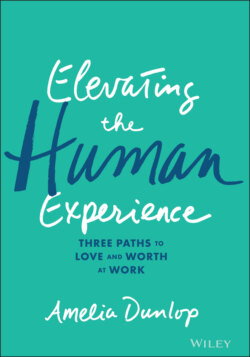Читать книгу Elevating the Human Experience - Amelia Dunlop - Страница 16
The Beginnings of Work
ОглавлениеWork is foundational to our being: it is in the doing of daily tasks that we create ourselves and the world around us. We create the safety and security that we need to thrive. We are like the Greek god Eros, who is depicted as one of the primordial gods in charge of creating the cosmos. As soon as we can pinch forefinger and thumb together as babies, we are placing blocks into buildings, stirring wooden vegetables with wooden spoons in pots and pans. We build, we make, we sing, we dance. All of this is work—exertion or effort directed to produce or accomplish something. We grow and our work evolves from play to productivity and profit. We push stones and bricks instead of blocks together. We care. We count. We heal. We tap plastic keys to form words to express ideas. All work. The Protestant work ethic created the connection between how hard we work and how well we live out our values. Descartes at the end of his extended exploration for something that could not be doubted concluded, “I think, therefore I am.” At its most basic level, thinking that cannot be doubted is work.
Since Adam and Eve were tossed out of the Garden of Eden, work has been central to the human experience. In Elizabeth Lesser's Cassandra Speaks, she retells the story of Adam and Eve as a journey of self-actualization, self-knowledge, and wisdom, not the “fall from grace” it is often depicted as. Our biblical ancestors went from a childlike state, Lesser argues, where all was provided for them, to one in which they provided for themselves through the fruits of their own labor. Work, it seems, is inevitable and unavoidable, defining us and shaping us on our journey from childhood to adulthood.
We call it work precisely because exertion is required. Work is defined by the presence of mental or physical exertion and is often about achieving some desired outcome. There are obstacles to be met, frustrations faced, and failures to be had. It takes work, as my 15-year-old son can tell you, sometimes just to pull the covers back and get out of bed. It takes work, as my 13-year-old son who has dyslexia knows, even to read these words on this page. It would be easier to do nothing, to ignore the needs of the body, of the bodies who depend on you, than to do the heroic task of exerting effort against inertia and leaving the garden.
